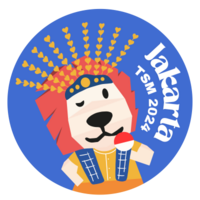2425T3 Jakarta/Course
| HOME | | COURSE | | ITINERARY | | ROLE | | TEAM | | ORGANIZATION | | REFLECTION |
Jakarta is the economic, cultural, and political centre of Indonesia. It is massive with 10+ million population in the city alone but it is sinking! Let's visit this melting pot of Javanese, Malay, Chinese, Arab, Indian and European architecture, language and cuisine before it moves to Nusantara.
It boost over 400 startups which is 80+% of Indonesia's startups, 2nd largest startup ecosystem in South East Asia (1st is Singapore) and 29th in the world. Notable unicorn startups include Traveloka, J&T Express, Akulaku, FinAccel, Dana Wallet, Xendit, Ajaib and others TokoPedia, Halodoc etc. We will explore the startup ecosystem with visits to startups, universities, and funding agencies. We will visit cultural centers that house a population of 277 millions and growing at 0.74%, it is the 4th largest country and largest island archipelago with 17,000 islands.
We will also explore it's connection to Singapore and SMU!
This course will help students
- Introduce to the entrepreneurship scene.
- Develop an understanding of the factors and ecosystem leading to a start-up.
- Aspire to be entrepreneurs and apply their findings to their own venture.
- Understand how to start a technology company.
- Build relationships with the companies we visit.
- Students will form their own teams on first day of class.
- Student teams will need to source for organization to visit.
Students will be assessed on planning, sourcing organization, in class and during the trip activities and conduct. Here is the grading criteria:
- Skills - I am better able to collaborate effectively with people of other cultures.
- Knowledge - I have gained new perspectives on intercultural, societal, and global issues.
- Network - I have broadened my network to include more contacts overseas.
- Attitude - I am better able to appreciate our interconnected world, where actions in one place have implications elsewhere.
- Attitude - I am more motivated to do my part in tackling societal and/or global issues.
- Other benefits and takeaways from your exposure to the rest of the world.
This course will be a pass/fail. To pass, you will need to get at least a B-. The grade breakdown is listed below.
| No | Time Frame | Topics | Assessment Type | Weighting |
|---|---|---|---|---|
| 1 | Pre-Trip | Organization sourcing | Team | 20% |
| 2 | Plan trip | Individual | 20% | |
| 3 | Trip | Discussion and Presentation | Individual | 20% |
| 4 | Trip role/helping others | Individual | 20% | |
| 5 | Reflection | Individual | 10% | |
| 6 | All | Wiki, Blog & Photos | Individual | 10% |
Here are the assignments:
- Pre Trip
- Teams are to source for organizations to visit. Research on the organization.
- Ecosystem: background, industry, culture, ecosystem, research universities, politics, aspiration, etc. Compare ecosystem to Singapore.
- Company/founder culture/trait such as connections (companies, country, customer focus), support environment (government, business, infrastructure, society, market maturity, reputation), and personality/company culture (integrity, leadership, competitiveness, entrepreneurship, savviness, creativity, innovativeness, dynamicity, risk taking, commitment to technology, excellent communication, team spirit, fun seeking, etc). Research on this by reading books, websites or interviews. Come up with examples of company events when this trait is vital to the company. Explore this trait in some of the organization we will visit.
- Organization: background, motivation, challenges, investments/employee stock ownership plan/intellectual property, strategy/business model/IPO, culture/personalities/politics/connections, etc. Students to prepare a company brief that is due before the trip.
- SMU Library Basic ReseachTSM. You may contact XIA Wei <weixia@smu.edu.sg> if you need to get SMU library resources while doing your research.
- Individual will be assessed based on the quality of your contributions in the role you play, getting organization, helping out with the trip planning and execution.
- Teams are to source for organizations to visit. Research on the organization.
- During the Trip (if it happens)
- Teams will ask questions, when the opportunity presents itself. Each team will introduce their company, present the focus and recommend improvements. Each team will have a backup team to support them (taking photos, questions, follow up, etc)
- Individuals will keep a journal/blog/diary/tweet (with video, photo, links, etc.) on the discussion and company visits. Focus on learning points and reflections. Compile your journal in the individual reflection page.
- Post Trip
- Reflection on your research
- Key takeaways (2) or learning points from the organization
- Quotes from presenter/senior management/owner/founder
- Recommendation on how the trip can be improved further
All acts of academic dishonesty (including, but not limited to, plagiarism, cheating, fabrication, facilitation of acts of academic dishonesty by others, unauthorized possession of exam questions, or tampering with the academic work of other students) are serious offences. All work (whether oral or written) submitted for purposes of assessment must be the student’s own work. Penalties for violation of the policy range from zero marks for the component assessment to expulsion, depending on the nature of the offense.
When in doubt, students should consult the instructors of the course. Details on the SMU Code of Academic Integrity may be accessed at http://www.smuscd.org/resources.html.
There will be several classroom meetings to organize the course, trip and research. Students will meet in classroom to present their research findings. The teams are required to update their progress using the wiki.
| Class (Week) | Topics | Comments |
|---|---|---|
| 1 | Course introduction, team formation and organization assignment. | Roles, Teams and Organisation. Team and group photos. |
| 2 | Organization groupings for each team and trip planning | Trip itinerary and Organisation Grouping. |
| 3 | Project work | Project work |
| 4 | Present project and itinerary (first come first serve)
Group Bonding |
Itinerary confirmation/Group Lunch |
| 5 | Visit company. | Reflection |
